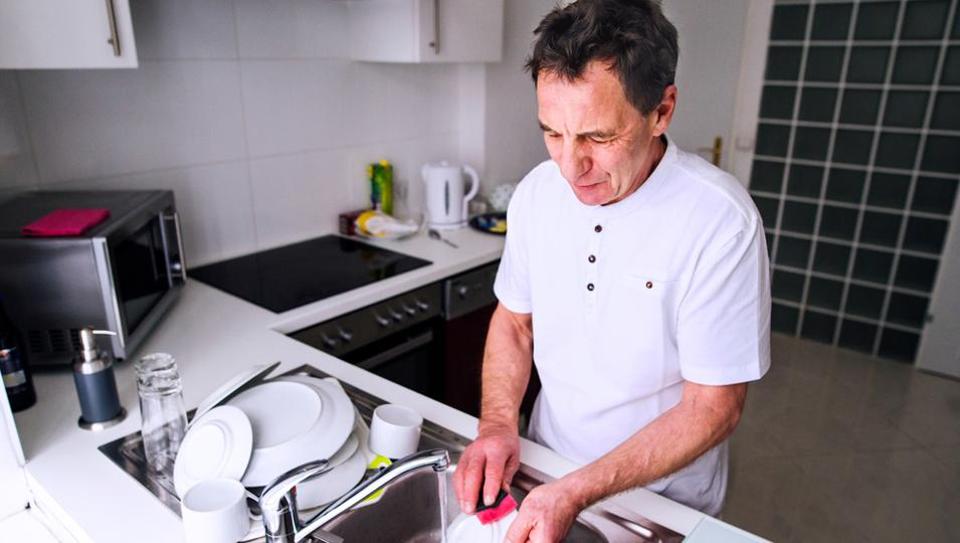高齢者にとって、家事労働はどんな効果があるのか?
この記事によれば、ハードな家事労働は、身体能力、認知力、注意力すべてに効果が見られたが、軽い家事は、長時間または何回もしたとしても、注意力には効果がなかった。
やはり掃除機をかけたり、雑巾がけのような身体を動かす家事が効果的。
今、コードレスの軽ーい掃除機購入を考えているのですが、、、良くないですね。ほこり探知機に頼らず、自分の目を使いほこりを探し、本体をずるずる引きずり、段差で持ち上げる、従来の掃除機身体にも、頭にも良いのでしょうね。
ルンバなんてもっての外だ。家事を手抜こうとすればするだけ認知症になり得るのかも。家事を楽にするためには、どうすべきかに頭を働かせることにします。

画像引用:hindustantimes.com
2021/12/10 level 8
Housework Could Improve Memory in Old Age
家事が高齢者の記憶力を向上させる
A recent study has found that housework could contribute to better memory and attention in old age.
家事が高齢者の記憶力と注意力に貢献していることがわかった。
The study, published in the journal BMJ Open, included 489 adults in Yishun, a large town in Singapore.
シンガポールの大都市イーシュン、489人での調査結果を公表した。
They were divided into two groups: a "younger" group with adults aged 21-64, and an "older" group for those aged 65-90.
21-64才と65-90才とのグループに分けられた。
The team tested the participants' levels of physical activity by asking them to complete simple tasks, such as walking, or standing from a seated position as quickly as possible.
参加者の身体のレベルを簡単な動きが可能かの質問でテストした---たとえば歩く、できるだけ素早く座っている状態から立つなど。
They performed cognitive function tests to assess memory and attention span.
記憶力、注意力を評価する認知機能のテストを受けた。
The participants were also asked about their housework, including the intensity and frequency of the tasks.
家事のレベルや頻度の質問にも答えた。
"Light" housework included tasks such as washing dishes, dusting and making the bed, while activities like changing the sheets, vacuuming and washing the floor were defined as "heavy" housework.
軽い家事は、食器洗い、ほこりを取る、ベッドを整えるなどで、ハードな家事は、シーツ交換、掃除機、床拭きなど。
The results showed that doing heavy housework was linked to greater mental and physical capacities in the older group.
高齢のグループではハードな家事は、知能や身体能力にかなり影響するという結果がでた。
For those doing high volumes of heavy housework, cognitive scores were found to be 8% higher than among those who did less heavy housework, and attention scores were 14% higher.
ハードな家事が多い方が認知力8%高く、注意力は14%高くなった。
(高齢者:長時間 ハードな家事 ⇒認知力〇 注意力〇 )
Older people who did a lot of heavy housework also scored 23% better in balance and coordination, and their sit-to-stand time was 8% faster.
高齢のグループでは、ハードな家事をすると、23%バランス感覚が良くなり、座る姿勢から立ち上がるスピードが8%速くなった。
(高齢者:多量 ハードな家事 ⇒身体能力〇 )
Light housework also seemed to help older people, but in different ways.
軽い家事は高齢者にとって良い効果があるが、項目によって結果は異なる。
Those who did high volumes of light housework had 5% better cognitive scores than those who did little of it.
軽い家事を多くする高齢者は、認知機能が5%良くなった。
(高齢者:多量 軽い家事 ⇒認知力〇 )
But unlike those who did a lot of heavy housework, they(high volumes of light housework) didn't have better attention spans — instead, they had better memories.
ハードな家事を多くする高齢者とは違って、軽い家事を多くする高齢者は、注意力は向上しなかったが、記憶力は向上した。
(高齢者:多量 軽い家事 ⇒認知力〇 注意力✖)
Light housework made little difference to physical results, however.
軽い家事は身体に与える結果は大差はなかった。
(高齢者:多量 軽い家事 ⇒身体能力△)
For the younger group, there was no difference in mental or physical results, regardless of how much housework they did.
若い人の知能や身体に現れる結果は違いがなかった。
However, the researchers noted that the younger group had, on average, five more years of education than the older group.
しかし、研究者は注目した---若い人は高齢者より、平均で5年以上長く教育を受けていたことを。
Higher education is linked to higher mental agility and slower cognitive decline, which could explain the study's lack of similar findings with the younger group.
高い教育は頭の回転の速度を上げ、認知低下がゆるやかになる---若い人のグループでは同じような調査結果はまだでてないので調査不足を意味する。
記事引用: